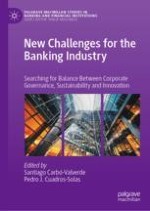2023 | OriginalPaper | Buchkapitel
6. Firm Pollution and Reputational Risk: Where Do We Stand?
verfasst von : Alexia Ventouri, Georgios Chortareas, Fangyuan Kou
Erschienen in: New Challenges for the Banking Industry
Verlag: Springer Nature Switzerland
Aktivieren Sie unsere intelligente Suche, um passende Fachinhalte oder Patente zu finden.
Wählen Sie Textabschnitte aus um mit Künstlicher Intelligenz passenden Patente zu finden. powered by
Markieren Sie Textabschnitte, um KI-gestützt weitere passende Inhalte zu finden. powered by
